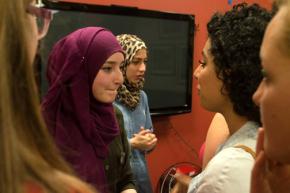Planning for BDS at Stanford
reports on organizing at Stanford University in solidarity with Palestine.
MORE THAN 100 students attended the Right to Education tour stop at Stanford University on November 12. The event featured two students from Birzeit University, Deema and Shatha, speaking about their experiences living under and resisting the Israeli occupation.
They shared personal stories about violent attacks by the Israeli military on their schools, the control and censoring of their curriculum by Israel, and organizing to access and demand education under the occupation. The event concluded with a an emotional moment, as Shatha and Deema showed that they suffer, fear, despair and hope, just like any student in the audience.
The Right to Education event was the culmination of an ambitious and successful quarter of organizing by Stanford Students for Justice in Palestine (SJP). Just a week prior to that event, SJP hosted Sahar Francis, the director of Addameer, an organization that advocates for Palestinian political prisoners.
That meeting drew 30 to 40 students, and Francis gave a compelling account of the abuse and torture that Palestinians face at the hands of Israel. Francis, as well as Deema and Shatha, appealed to Stanford students to push for divestment as part of the broader, and growing, boycott, divestment and sanctions (BDS) movement.

That appeal resonated with Stanford SJP, whose main work of the quarter was helping establish Stanford Out of Occupied Palestine, a coalition of students and student groups pushing for Stanford University to divest from companies enabling the occupation and associated human rights abuses.
The formation of the coalition itself is a major milestone and a testament to the growing solidarity with Palestine to be found among young people in the U.S. It also demonstrates the rising awareness among student activists that struggles against exploitation and oppression are connected--that Palestine and Ferguson are related, that the apartheid wall in the West Bank and the U.S.-Mexico border wall share more in common than just their physicality.
At this point, the coalition includes Stanford SJP, MEChA de Stanford, Stanford NAACP, the Black Student Union, the Muslim Student Awareness Network, the Asian American Students' Association, Students for Alternatives to Militarism, the Student and Labor Alliance, the Arab Student Association at Stanford, the Pilipino American Student Union and the Stanford Asian American Activism Committee. This coalition will likely grow and is already gaining the support of faculty and staff.
The coordinated opposition to divestment has also begun. Student senators and student group leaders have been offered free trips to Israel, a common pro-Israel propaganda process on American campuses. Apologists for Israel's attack on Gaza have penned a handful of op-eds in campus papers offering worn out talking points.
In contrast, Stanford Out of Occupied Palestine, through op-eds and educational events, is already connecting with the growing questioning of Israel's actions among students. If nothing else, the divestment campaign will be an excellent opening to educate the campus and turn that questioning into support for the Palestinian cause.
Stanford SJP is well aware of the official persecution of pro-Palestine sentiment activism by university administrations, for example at Loyola University and at the University of Illinois Urbana-Champaign. Pushing for divestment won't be easy at Stanford. That said, the formation of Stanford Out of Occupied Palestine, the success of the divestment resolution at UCLA, and the development of real awareness and action on campus against sexual violence and in solidarity with Ferguson are all reasons for optimism.
This divestment campaign will make real headway, and at Stanford and many other campuses, the Israeli government will pay a political price for the barbarity it unleashed upon Palestinians in Gaza this summer.


